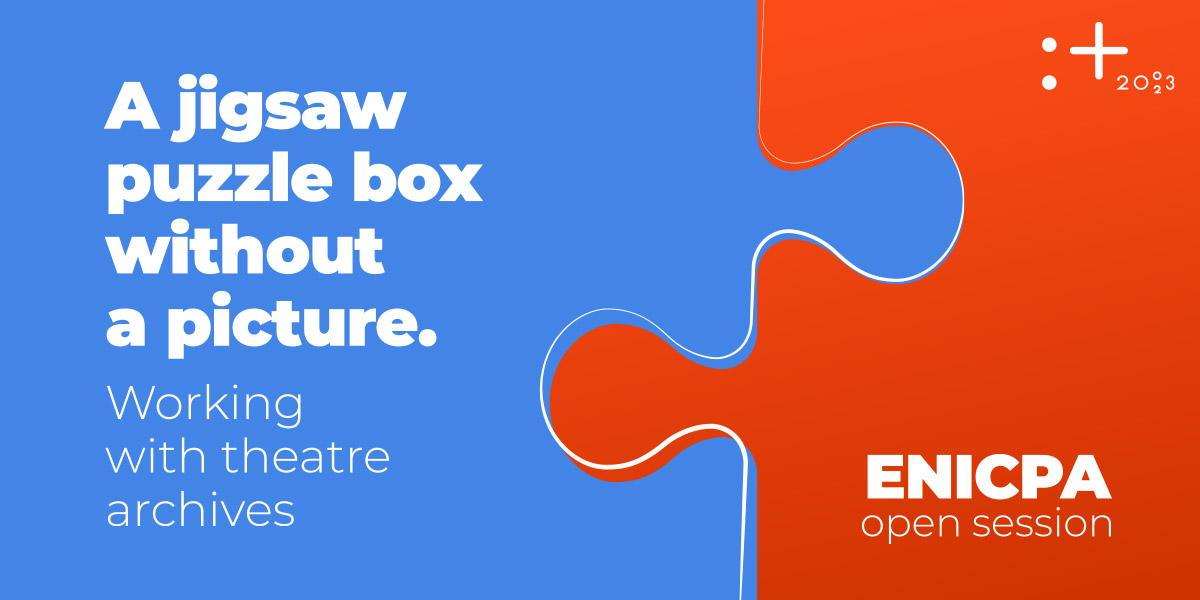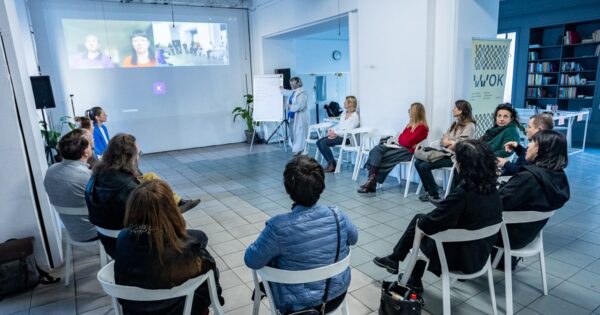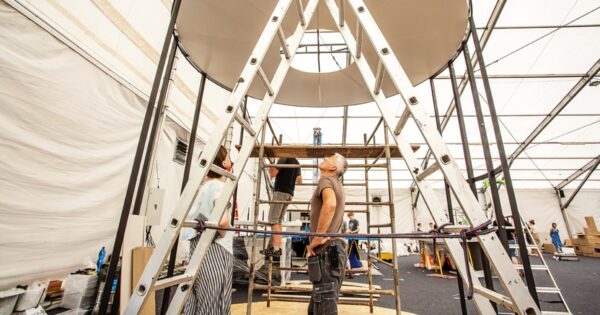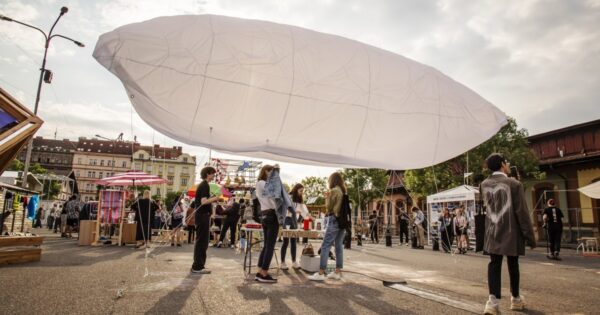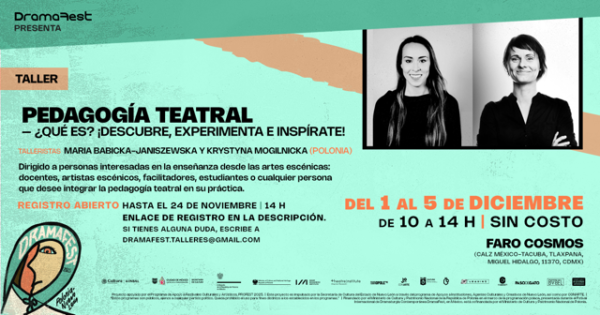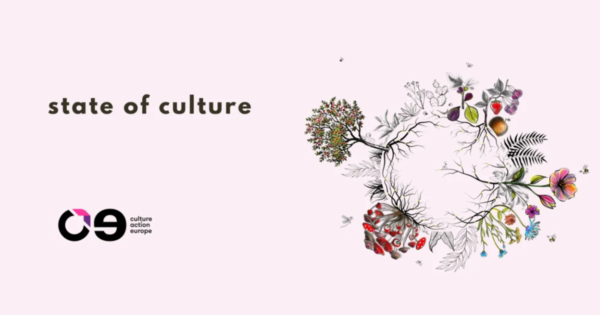The Zbigniew Raszewski Theatre Institute invites you to an open session to be held in the Institute’s main building at Jazdów 1, Warsaw on 11 October at 9.30 am as part of the international meeting of the European Network of Information Centres for the Performing Arts (ENICPA).
We often like to discuss how to organise performing arts archives, both physical and virtual. But what about the sources collected in those archives? Written and spoken, photographic and phonographic, audiovisual and others? If we are aware that theatre takes place only “here and now”, and that the “there and then” exists only as an afterimage, do we know how to aptly use the preserved documents, which more often than not resemble a jigsaw puzzle box without the corresponding picture? The question we want to ask is not how to faithfully reconstruct a historical performance (this is a utopian concept), but how to resist the temptation of over-interpretation when we try to imagine what is most probable.
Everyone is welcome to attend. Please send an email with your name and surname to bilety@instytut-teatralny.pl if you are interested in attending the session in the Institute’s main building in Warsaw.
There will be a webcast of the session on our YouTube channel and all presentations will be given in English.
Admission is free.
Venue: theatre hall, The Zbigniew Raszewski Theatre Institute, Jazdów 1, Warsaw
9.30 am Session opening, Jadwiga Majewska (Zbigniew Raszewski Theatre Institiute)
9.50 am The performance that “does not exist and never did”: Paradoxes of reconstructing a director’s script
dr Mateusz Żurawski (Zbigniew Raszewski Theatre Institiute – Aleksander Zelwerowicz National Academy of Dramatic Art)
Discussion
10.30 am Coffee break
11.00 am Actors’ manuscripts. The acting arcana of the 19th century
dr hab. Dorota Jarząbek-Wasyl (Jagiellonian University)
11.30 am “Hamlet” and Mijal followers
dr Agnieszka Wójtowicz (University of Opole)
Discussion
12.00 am Coffee break
12.30 am Invisible guardians of the stage: The role of stage managers’ reports in theatre archives
Natalia Cierniak (Aleksander Zelwerowicz National Academy of Dramatic Art)
1.00 pm Notes on filming theatre: Three recordings of Jerzy Grzegorzewski’s “Little Spirit”
dr Wojciech Świdziński (Aleksander Zelwerowicz National Academy of Dramatic Art)
Discussion
1.30 pm End of session
The performance that ‘does not exist and never did’. Paradoxes of reconstructing a director’s script
Mateusz Żurawski, PhD
Zbigniew Raszewski used to say that a theatre historian should make every effort to ensure that their reconstruction of a theatrical work that is the object of their research is documented and critical, because otherwise, yielding to the temptation of over-interpretation, they could create a performance ‘that does not exist and never existed’. Although it is true that the idea of theatrical reconstruction is a utopian concept, this does not mean that attempts at effecting it should not be made. An incomplete reconstruction is not false; it is simply fragmentary, and the conclusions that can be drawn from it can be instructive.
Mateusz Żurawski – Theatre historian, editor, holder of a PhD in humanities (2017), a graduate of the Theatre Studies Department at the Aleksander Zelwerowicz National Academy of Dramatic Art in Warsaw (2008). Since 2010, a lecturer at the Academy (since 2017 as an assistant professor), since 2021, the head of the Documentation Department at the Zbigniew Raszewski Theatre Institute, and from 2010 to 2021 a programme specialist at the Stanisław Ignacy Witkiewicz Studio Theatre in Warsaw. He is the initiator and organiser of numerous research, artistic and popularisation projects related to Jerzy Grzegorzewski and his work. Among others, he is the co-author (with Ewa Bułhak) of a three-volume critical edition of Grzegorzewski’s scripts Warjacje, Improwizacje, Rekonstrukcje [Variations, Improvisations, Reconstructions] (Theatre Institute 2012–2018). He writes for, among others, Teatr. Didaskalia, and Pamiętnik Teatralny periodicals.
Actors’ manuscripts. The acting arcana in the 19th century
Dorota Jarząbek-Wasyl, PhD
Actors’ manuscripts from the 19th century are, along with promptbooks, the most interesting documents that shed light on the art of acting in the era of the Star Theatre. They are a fascinating source of information on the subsequent stages of developing a role, memorisation techniques, and detailed descriptions of costumes and make-up, but also some of the less obvious but highly interesting matters relating to the ethics and everyday life of actors. In my presentation, I will discuss three types of annotations found in actors’ manuscripts and three possible ways of using them in research reflection: 1) records of the rhythm of the ensemble’s work; 2) the interpretation and process of bringing a role to life; 3) echoes of the actor’s private life (portrait of the actor). The underlying material of my work is the unique manuscripts of the comedian Alojzy Żółkowski.
Dorota Jarząbek-Wasyl – Associate Professor of Theatre Studies at the Jagiellonian University in Kraków. Her research interests include the history of theatre and drama in the 19th and 20th centuries, particularly the process of theatrical creation, theatrical customs, the art of acting, as well as editing of theatre sources (actors’ diaries and promptbooks). She published several dozen articles in academic journals and edited volumes. She is the author of Słowo i głos. Problem rozmowy w dramacie w ujęciu teoretycznym i historycznym [Word and Voice. The theoretical and historical aspects of conversation in drama] (2006), Za kulisami. Narodziny przedstawienia w teatrze polskim XIX wieku [Behind the curtain. The birth of the performance in Polish theatre in the 19th century] (2016) Archiwum teatru XIX wieku. Ludzie, dokumenty, historie [The 19th theatre archives. People, documents. stories] (with Barbara Maresz, 2019), and most recently Stanisław Wyspiański, Protesilas i Laodamia. Scenariusz prapremiery w 1903 [Stanisław Wyspiański, Protesilaus and Laodamia. The script of the world premiere in 1903] (2022).
“Hamlet” and the Mijalowcy
Agnieszka Wójtowicz, PhD
The purpose of my research is to demonstrate how and why Grotowski was involved with the politics and political system in Communist Poland – not only to what extent he was compromised but to what extent he compromised the authorities. I am especially interested in assessing the level of risk, in terms of both his professional and personal life, which Grotowski was exposed to, and to what extent the Polish Secret Police and Communist Party contributed to this risk. I have discovered some rare and precious materials. These include records of the Voivode Office for Press Control in Opole and interesting secret police files discovered at the Institute of National Remembrance (IPN). These facts and documents are a source of invaluable knowledge allowing us to revisit certain stereotypes or even myths about Theatre of 13 Rows in Opole period.
Agnieszka Wójtowicz – Theatre historian and a graduate of Theatre Studies in Kraków. Author of the monograph “Od Orfeusza do Studium o Hamlecie. Teatr 13 Rzędów w Opolu (1959-1964)” [From Orpheus to Hamlet. The Theatre of 13 Rows in Opole (1959-1964)]. (Wrocław 2005) and “Grotowski. Bedeker opolski” [Grotowski. The Opole Guidebook] (Opole 2019). Her research interests focus around the history of Polish theatre in the 20th century, including the theatrical work of Jerzy Grotowski and the theatrical life of Vilnius in the interwar period. She collaborated as a writer for a number of periodicals including Notatnik Teatralny, Didaskalia, Teatr", Teatr Lalek, Pamiętnik Teatralny, and Lithuanian Ars et Praxis, and Menotir. Co-author of the documentary film about Jerzy Grotowski, Playing with Memory. Jerzy Grotowski in Opole.
Invisible guardians of the stage: The role of stage managers’ reports in theatre archives
Natalia Cierniak
In my presentation, I will analyse one of the archival documents of the Polish theatre, namely the stage manager’s report. This document was created out of an administrative need to account for the absences and delays of a team working on a performance. It is a report developed by a stage manager from the very first rehearsal until the performance presentation period ends. At the same time, it is a source of much more information than just the staff attendance list, as it features the author’s comments and notes on working on the performance. In my paper, I will present a wealth of information that can be retrieved from the stage manager’s report and suggest potential avenues for further research based on this document. I will demonstrate that a carefully analysed report can provide us with more information than just about the performance itself. It can also tell us a great deal about the institution in which a particular production is staged and about the socio-political climate of the time. I will show that the stage manager’s report is not only an account of the production of a play, but also a detailed source documenting the work of an often invisible member of the theatre staff, the stage manager.
Natalia Cierniak – A graduate (Bachelor’s degree) of the Theatre Studies Department at the Aleksander Zelwerowicz National Academy of Dramatic Art in Warsaw (2022). She cooperated with the education department of the TR Warszawa theatre as an accessibility coordinator (in the 2021/2022 season) and is currently a collaborator of the Documentation Department at the Zbigniew Raszewski Theatre Institute (since 2022) and the HyPaTia project at the Institute of Art of the Polish Academy of Sciences (since 2023). She co-organised (with Aleksandra Urban) the academic conference “Who is behind the fourth wall? Participatory theatre” (National Academy of Dramatic Art, 2023).
Notes on filming theatre. Three recordings of Jerzy Grzegorzewski’s “Little Spirit”
Wojciech Świdziński, PhD
Filming theatre today is as easy, widespread and effective as it has ever been. From the perspective of theatre scholars, the databases of recordings are of extraordinary value. But do perfect recordings exist? Do they truly immortalise performances? And how trustworthy are they? In an attempt to answer these questions, I will present three basic methods of recording a theatre performance: the technical recording, the core recording, and the television adaptation. I will discuss their strengths and weaknesses. The reference material I will use is Jerzy Grzegorzewski’s 2004 production of “Little Spirit”, which was recorded in three different ways, corresponding to the three ‘genres’ of recording that I analyse in my paper.
Wojciech Świdziński – Theatre and film scholar, holder of a PhD in humanities (2014), a graduate of the Theatre Studies Department at the Aleksander Zelwerowicz National Academy of Dramatic Art in Warsaw (2007). Member of the Polish Society for Film and Media Studies. Since 2015, a lecturer at the National Academy of Dramatic Art (since 2020 as an assistant professor). His research interests include the reception of film, the relationship of film and other arts, and silent cinema. He is the author of the monograph Co było grane? Film zagraniczny w Polsce w latach 1918–1929 na przykładzie Warszawy [What was screened? Foreign film in Poland in the years 1918-1929 on the example of Warsaw] (Institute of Art of the Polish Academy of Sciences, 2016) and editor of Andrzej Włast’s volume Dziesiąta muza (Impresje). Felietony filmowe z lat 1923–1924 [The tenth muse (Impressions). Notes on film in the years 1923-1924] (Institute of Art of the Polish Academy of Sciences, 2017). He has published in, among others, Kwartalnik Filmowy, Ekrany, Teatr, and Stolica periodicals.
